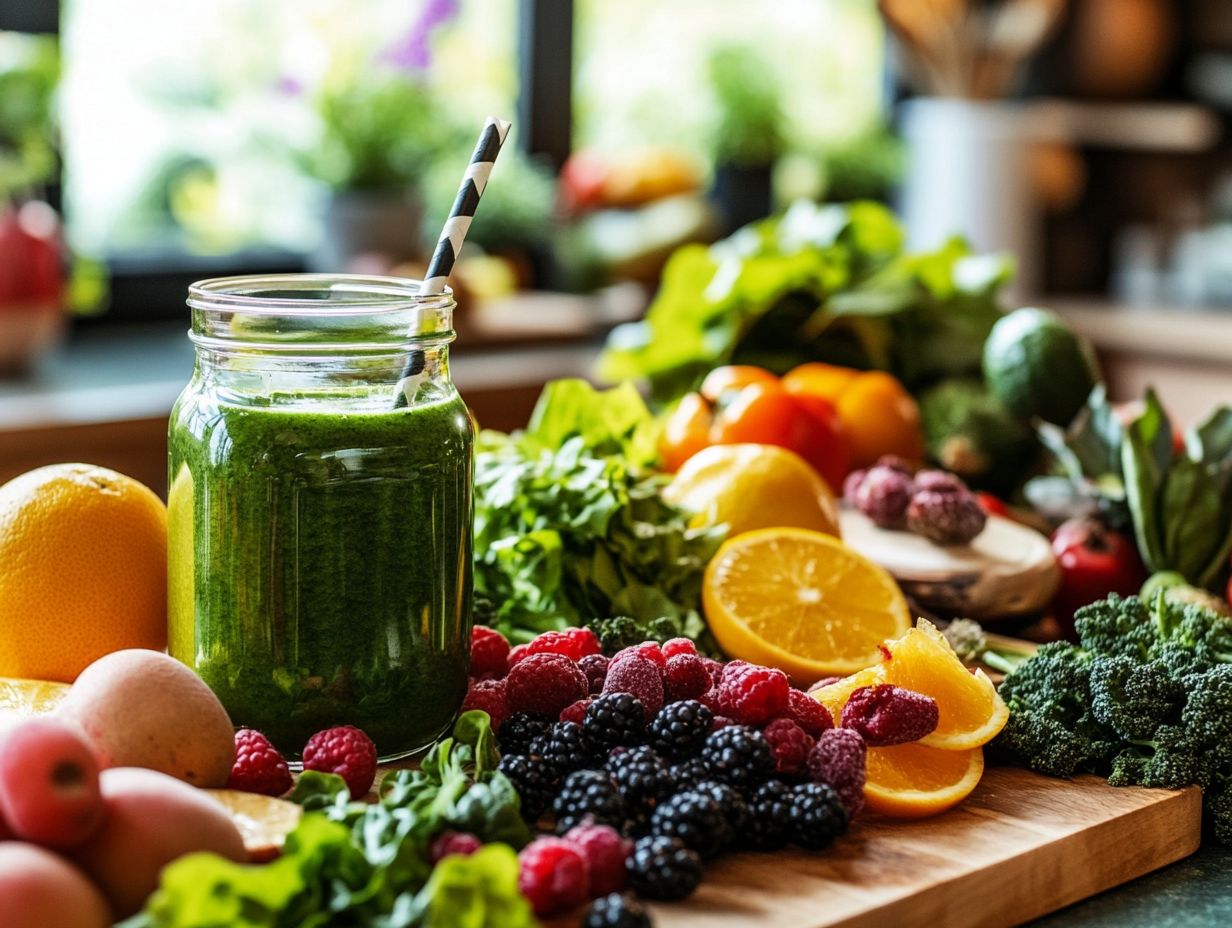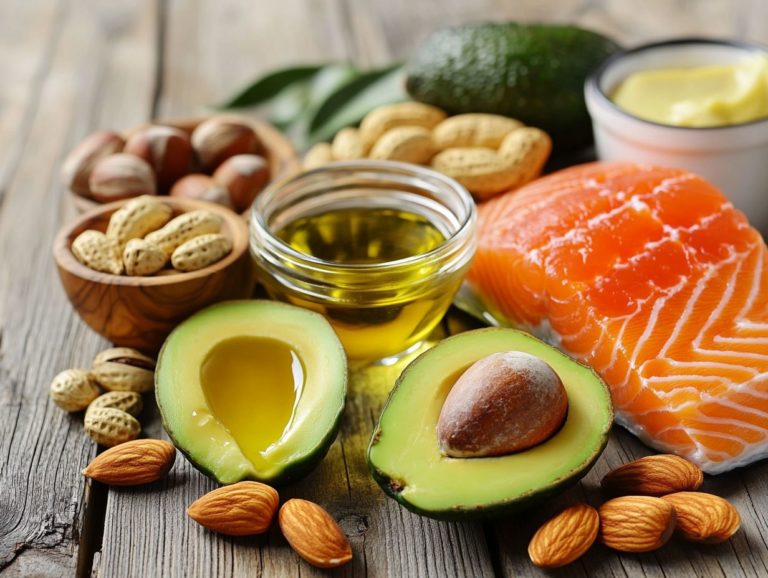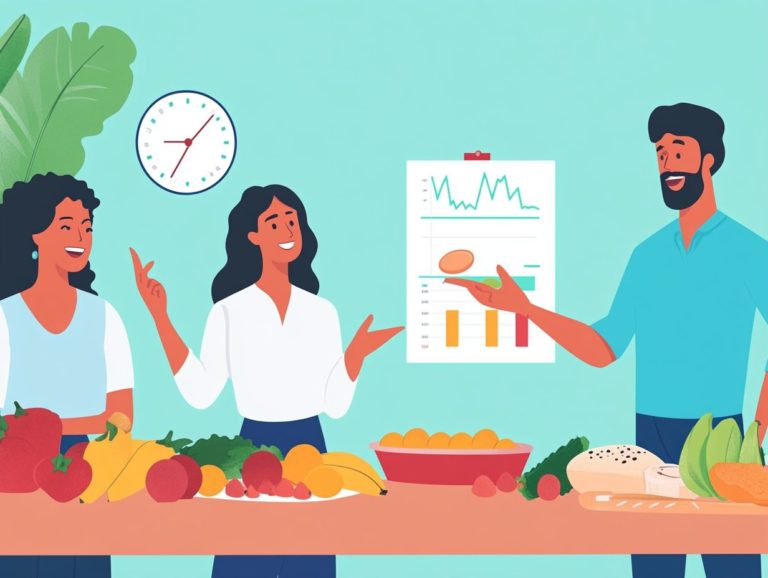Detox Diets: Fact or Fiction?
Detox diets have undeniably captured the spotlight, luring you in with enticing promises of swift weight loss and enhanced well-being.
But what are these diets really about? Ranging from juice cleanses to raw food plans, the options are plentiful, each touting its own unique benefits. However, the effectiveness of these diets is a subject of ongoing debate.
This article delves into the various types of detox diets, assesses their credibility, examines potential risks, and presents healthier alternatives for those eager to refresh their lifestyle.
Explore the truth behind detox diets and discover a balanced approach to wellness!
Contents
Key Takeaways:

- Detox diets may promise quick weight loss, but scientific support is limited.
- Extreme detox diets can cause nutrient deficiencies and health risks.
- Consult a healthcare professional before trying any detox diet.
- The best way to “detox” is by adopting healthy eating habits.
What are Detox Diets?
Detox diets are structured nutritional regimens designed to help remove harmful substances from the body. They claim to rejuvenate essential organs like the liver and kidneys. These diets often tout impressive health claims about their ability to cleanse your system and enhance your overall well-being.
They may incorporate various dietary supplements, fiber sources, and prebiotic foods to support your detoxification processes. However, many medical professionals debunk the myths suggesting that such diets are vital for maintaining health.
You ll find that detox diets come in a wide array, from juice cleanses relying solely on fruit and vegetable juices to more comprehensive plans that include whole foods rich in detoxifying nutrients.
For instance, leafy greens, cruciferous vegetables, and antioxidant-rich fruits are frequently highlighted for their potential to aid the liver in filtering out toxins. Proponents often argue that these diets can enhance energy levels, sharpen mental clarity, and contribute to a more radiant complexion.
Despite these potentially appealing benefits, be cautious! Before diving into detox diets, ensure you’re making safe choices. Consulting healthcare professionals is a wise move to tailor decisions to your unique needs.
Types of Detox Diets
Detox diets present a myriad of options, each crafted with distinct methods aimed at cleansing the body and enhancing overall health.
- Juice Cleanses: Harness the power of fruits and vegetables to nourish your system while flushing out impurities.
- The Master Cleanse: This diet offers a liquid regimen that incorporates fasting intervals with specific detoxification concoctions.
- Raw Food Diets: Focus on unprocessed foods that promote vitality.
- Intermittent Fasting: Give your body essential breaks from digestion to optimize detoxifying processes.
Juice Cleanses
Juice cleanses involve consuming exclusively juices made from fruits and vegetables, claiming they flush out toxins and enhance hydration. It s worth noting that some health assertions tied to these diets may lack solid scientific backing.
Advocates argue that juice cleanses can boost fiber intake, deliver essential vitamins, and support liver detoxification. However, critics often challenge these detox myths, emphasizing the importance of solid food and balanced nutrition.
Many people embark on these cleanse regimens hoping to jump-start weight loss or revitalize their energy levels, all in pursuit of a refreshing sense of renewal. Yet, health writers frequently caution against potential drawbacks, such as the risk of nutrient deficiencies from extended juice consumption.
While hydration improves during these cleanses, relying solely on liquid diets can lead to fatigue, muscle loss, or digestive issues over time. As you consider such detox diets, it s crucial to weigh the risks against the supposed benefits, ensuring that any health decisions you make are well-informed and balanced.
Master Cleanse
The Master Cleanse is a detox diet involving a liquid fast. You ll consume a mix of lemon juice, maple syrup, and cayenne pepper while avoiding solid foods for about ten days.
Be mindful such fasting periods can lead to electrolyte imbalances if not managed carefully. Proponents claim this method encourages your body to eliminate toxins, enhance digestion, and facilitate weight loss. However, it has ignited debates about dietary restrictions and safety.
Many health professionals caution against the potential risks associated with extreme calorie deficits and the absence of essential nutrients. Critics argue that this regimen may not be suitable for everyone, particularly those with preexisting health conditions or specific dietary requirements.
The focus on detoxification prompts questions about its true effectiveness, given that your body naturally detoxifies through organs like the liver and kidneys.
Therefore, if you re considering this approach, it s vital to consider both the amazing benefits and possible risks to ensure your health and safety.
Raw Food Diet

The raw food diet encourages eating uncooked, unprocessed foods, mainly fruits and vegetables. This diet aims to maximize nutrients and support detoxification processes.
However, critics caution that nutritional deficiencies may arise if this diet isn’t balanced with other food groups.
By concentrating on whole, unadulterated ingredients, you can strengthen your body s natural detox organs, such as the liver and kidneys, vital for eliminating harmful substances. This dietary approach may also reduce your exposure to food contamination often lurking in processed options, potentially lowering your intake of toxins.
In your quest for wellness, you might find that these cleansing practices enhance your overall health and cultivate a deeper awareness of what you consume, promoting a lifestyle that prioritizes purity and nutrient density.
Intermittent Fasting
Intermittent fasting cycles between eating and fasting. This method may help your body eliminate toxins and rejuvenate your immune system. It has gained traction for its simplicity and potential health benefits, including improved cardiovascular health. However, it s important to critically evaluate the health claims associated with this fasting technique.
Recent studies suggest that intermittent fasting can enhance your body s natural detoxification processes. Research shows that these fasting intervals may stimulate autophagy, a process where your body cleans out damaged cells, thereby reducing accumulated toxins.
Some findings indicate a potential decrease in inflammation, which often hampers efficient detoxification. While many advocates highlight the benefits of dietary supplements alongside intermittent fasting, it s essential for you to consult scientific literature to identify the most effective strategies tailored to your health needs.
Do Detox Diets Actually Work?
The effectiveness of detox diets is widely debated. While some support their benefits, others highlight our body’s natural detox systems and question the need for such diets.
While some may argue that detox diets play a role in facilitating the detoxification process, helping to eliminate toxins and enhance overall health, others counter these claims by debunking various detox myths and highlighting the body s inherent detoxification systems.
Evaluating the Evidence
Evaluar la evidencia relacionada con las dietas de desintoxicaci n requiere sopesar cuidadosamente tanto los estudios cient ficos como los informes anecd ticos que a menudo promocionan diversas afirmaciones de salud.
Algunas investigaciones pueden insinuar beneficios potenciales de programas de desintoxicaci n espec ficos. Sin embargo, los profesionales m dicos suelen advertir sobre los mitos enga osos de desintoxicaci n que pueden llevar a elecciones de salud da inas o restricciones diet ticas innecesarias.
Numerosos estudios que examinan los procesos de desintoxicaci n iluminan la notable capacidad del cuerpo para deshacerse de toxinas de manera natural, sin recurrir a dietas extremas o costosos suplementos diet ticos.
Por ejemplo, una revisi n integral realizada por expertos en nutrici n revel que, aunque algunas personas informaron p rdida de peso a corto plazo o niveles de energ a mejorados tras seguir dietas de desintoxicaci n, estos resultados estaban t picamente vinculados a una reducci n temporal en la ingesta cal rica en lugar de cualquier verdadero beneficio de desintoxicaci n.
Tales hallazgos subrayan la importancia de adoptar un enfoque equilibrado y sostenible hacia la salud. Se anima a priorizar alimentos integrales y actividad f sica regular sobre m todos de desintoxicaci n potencialmente enga osos.
Potential Risks and Side Effects
Numerosas dietas detox promueven una variedad de beneficios para la salud. Sin embargo, es esencial reconocer los riesgos y efectos secundarios significativos que las acompa an.
Podr as enfrentar problemas como deficiencias nutricionales derivadas de la ingesta restringida de alimentos, desequilibrios electrol ticos por el ayuno prolongado y diversas complicaciones de salud que pueden surgir al depender nicamente de m todos de desintoxicaci n.
Es importante abordar estas dietas con precauci n y conciencia.
Impact on Nutrient Intake and Overall Health

El impacto de las dietas detox en tu ingesta de nutrientes puede ser significativo. A menudo llevan a deficiencias nutricionales debido a restricciones diet ticas estrictas. Aunque algunas afirmaciones de salud mencionan mejoras en el bienestar general durante y despu s de la desintoxicaci n, es vital considerar el equilibrio de nutrientes necesario para mantener las funciones corporales.
La falta de vitaminas y minerales esenciales puede resultar en fatiga, un sistema inmunol gico debilitado y varios problemas de salud. Para mitigar estos riesgos, enf cate en incorporar una variedad de alimentos integrales en tu dieta, asegurando que recibas nutrientes grandes, como prote nas, y peque os, como vitaminas y minerales, de manera adecuada.
Los suplementos diet ticos tambi n pueden desempe ar un papel crucial al llenar los vac os dejados por opciones alimentarias limitadas durante la desintoxicaci n. Antes de realizar cambios diet ticos importantes, es sabio consultar con un profesional de la salud, quien puede ofrecer orientaci n personalizada para ayudarte a evitar deficiencias nutricionales y mejorar tu bienestar general.
Alternatives to Detox Diets
Si deseas mejorar tu salud sin recurrir a las extremidades de las dietas detox, adoptar h bitos de alimentaci n saludables ofrece una alternativa sostenible y efectiva.
Al centrarte en una dieta basada en plantas, rica en frutas, verduras y granos integrales, puedes potenciar de manera natural los procesos de desintoxicaci n de tu cuerpo. Junto con una adecuada hidrataci n y elecciones alimentarias intencionales, este enfoque mejora tu bienestar general, mientras evitas los riesgos a menudo asociados con las dietas de limpieza.
Healthy Eating Habits for Detoxification
Adoptar h bitos de alimentaci n saludables es fundamental para apoyar los procesos naturales de desintoxicaci n de tu cuerpo. Conc ntrate en alimentos integrales y densos en nutrientes, como frutas, verduras y legumbres, que proporcionen los nutrientes cr ticos que tu cuerpo necesita para desintoxicarse de manera efectiva.
Una dieta basada en plantas no solo ayuda a reducir las toxinas, sino que tambi n mejora tu salud y bienestar general. Para maximizar los beneficios de estas elecciones diet ticas, es importante incorporar estrategias espec ficas que se adapten a tus restricciones diet ticas individuales.
Por ejemplo, al planificar tus comidas, enfatiza la producci n de temporada. Esto no solo garantiza frescura, sino que tambi n mejora tu ingesta de nutrientes.
Incluir alimentos conocidos por apoyar los rganos de desintoxicaci n, como remolachas, ajo y verduras de hoja verde, puede optimizar a n m s tus funciones corporales. Mantenerte adecuadamente hidratado es vital; beber abundante agua y t s herbales puede ayudar a eliminar impurezas.
Al implementar estos pasos pr cticos, puedes asegurar un enfoque equilibrado hacia la desintoxicaci n, convirti ndola en una parte natural y sostenible de tu estilo de vida.
Consulta con un profesional de la salud y comienza a explorar nuevas recetas para elevar tu bienestar hoy!
Frequently Asked Questions
What are detox diets?
Detox diets are short-term eating plans that aim to cleanse your body and promote weight loss. They typically remove certain foods while increasing others.
Are detox diets effective for weight loss?

Detox diets may cause short-term weight loss, but it often comes from water loss, not fat loss. Over time, these diets can actually slow your metabolism, making it harder to keep weight off.
Do detox diets eliminate toxins from the body?
There’s no scientific proof that detox diets remove toxins. Your body naturally detoxifies through the liver, kidneys, and colon.
Can detox diets improve overall health?
Detox diets often cut out important nutrients, leading to deficiencies. A balanced diet is key to supporting your overall health.
Are there any potential dangers of detox diets?
Beware! Detox diets can cause dehydration, nutrient deficiencies, and disrupt your body’s natural detox processes. They can also lead to emotional stress and disordered eating habits.
Are there any benefits to detox diets?
Some people might feel better digestion or increased energy from avoiding processed foods and sugars. However, these effects are usually temporary and not sustainable.






